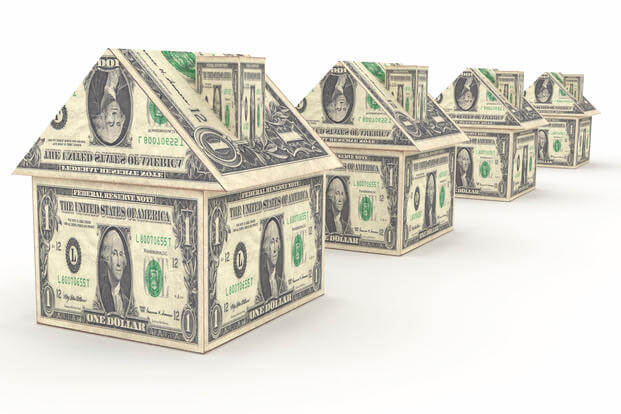Both VA cash-out refinancing and home equity loans let homeowners access the equity in their homes, but they serve slightly different purposes and work in different ways. Your choice depends on your financial goals, eligibility, and current mortgage situation.
A VA cash-out refinance is best for veterans who want to refinance their mortgage and access cash at the same time, with favorable VA terms. By contrast, a home equity loan is the better choice for homeowners who prefer a second loan and want to keep their current mortgage unchanged.
VA Cash-Out Refinance Overview
A VA cash-out refinance replaces your existing mortgage with a new one, letting you take out part of your home's equity as cash. This option is specifically for eligible veterans, active-duty service members, and qualifying spouses. This type of loan:
- Combines your current mortgage and cash-out amount into a single loan
- Can be used to refinance a non-VA loan into a VA loan
- May offer competitive interest rates compared to traditional loans
- Doesn't require private mortgage insurance (PMI), regardless of equity
- Can have a loan amount up to 100% of the home's value in most cases
Read More: Inside the VA Cash Out Refinance
Home Equity Loan Overview
A home equity loan can be a great way to take cash out of your home, whether it's for college tuition, home renovations, or to pay down credit card debt. A home equity loan allows you to borrow against your home's equity without changing your current mortgage. It's suitable for homeowners who want a lump sum for a specific purpose, like home improvements or debt consolidation. This type of loan:
- Functions as a separate loan, keeping your current mortgage as is
- Provides a fixed lump sum with predictable monthly payments
- Is typically limited to 80%-90% of your home's value, minus the existing mortgage balance
- Requires sufficient home equity to qualify
- Has interest rates that are usually higher than first-mortgage refinancing options
Similarities of a Cash-Out Refinance and Home Equity Loan
Here's what a cash-out refinance and a home equity loan have in common:
- Access to home equity: Both loan types let you borrow money against the equity you've built in your home. Both usually require sufficient equity in your home to qualify.
- Lump-sum cash payout: Both offer a one-time payment upfront, providing immediate funds for purposes like home improvements, debt consolidation, or major purchases.
- Secured by your home: Both loans are secured by the property, meaning the home serves as collateral. If payments are not made, you risk foreclosure.
- Lower interest rates: Because they are secured loans, interest rates are typically lower than those on unsecured loans, such as personal loans or credit cards.
- Tax-deductible interest (if used for home improvements): If the money you borrow is used for eligible home improvement projects, the interest on both types of loans may be tax-deductible under IRS rules.
- Repayment terms: Both options involve fixed repayment terms, with predictable monthly payments over a set period.
How a Cash-Out Refinance and Home Equity Loans Differ
While both options allow homeowners to borrow against their home's equity, they differ in structure, purpose, and how they affect your mortgage. Understanding these differences will help you decide which option best fits your financial goals and current mortgage situation.
Here's a breakdown of the key differences:
| Cash-Out Refinance | Home Equity Loan | |
Loan Structure |
Replaces your existing mortgage with a new, larger loan.
Combines your remaining mortgage balance with the amount of equity you're borrowing into a single loan. Comes with new terms, such as a new interest rate and repayment period. |
Acts as a second loan in addition to your current mortgage. Leaves your primary mortgage untouched. Requires separate monthly payments for the home equity loan and your original mortgage. |
| Interest Rates | Usually offers lower interest rates compared to home equity loans since it replaces your primary mortgage.
Rates are similar to traditional mortgage rates. |
Typically has higher interest rates than a cash-out refinance because it's a second loan.
Rates are fixed for the life of the loan. |
| Loan Limits | For VA cash-out refinance loans, you may borrow up to 100% of your home's appraised value (for eligible borrowers).
Conventional cash-out refinances often cap at 80%-90% of your home's value. |
Generally allows you to borrow 80%-90% of your home's equity, minus your existing mortgage balance. |
Monthly Payments |
Results in a single monthly mortgage payment that includes the refinanced amount. | Adds an additional monthly payment alongside your current mortgage. |
Loan Purpose |
Ideal for those seeking to lower their mortgage rate, change loan terms, or refinance from a non-VA to a VA loan while taking out cash. | Better for those who don't want to alter their current mortgage but need a lump sum for a specific purpose, such as home renovations or large expenses. |
Pros and Cons of a VA Cash-Out Refinance and Home Equity Loan
To summarize, as we've seen, VA cash-out refinance lets you replace your current mortgage with a new one, rolling your loan balance and the cash you're borrowing into one payment, often with lower rates and no PMI. A home equity loan gives you a lump sum of cash with fixed rates and steady payments, so it's great for one-time expenses without touching your original mortgage.
VA Cash-Out Refinance Pros and Cons
A VA-backed cash-out refinance loan has several benefits:
- You can turn your home's equity into cash.
- You may be able to drop your mortgage rate at the same time.
- You may be able to gain the ability to pay off a non-VA loan if needed, such as high-interest debt like a credit card balance.
- You can pay off liens, pay for school or make home improvements.
- You may be able to eliminate private mortgage insurance (PMI).
A cash-out loan can pay off VA, FHA, or conventional mortgages, regardless of whether they're up to date or behind. The loan needs to be secured by a first lien on the property, and any leftover funds can be taken as cash for lender-approved purposes.
Since the government backs these loans, they're usually cheaper than refinancing options available to civilians. A cash-out refinance also lets you turn a non-VA loan into a VA-backed loan. Unlike a second mortgage, which adds another lien to your property, a VA cash-out refinance combines everything into one loan. This can often mean lower interest rates (usually 2--3% less) and makes things easier for monthly payments and tax time.
That said, VA cash-out refinance loans still come with similar risks as home equity loans and lines of credit because you're taking on more debt and giving up equity in your home. Depending on what you need, you might find that traditional home equity loans or lines of credit offer more cash or better flexibility.
Cons of a cash-out refinance include:
- It increases your mortgage balance. Extending the repayment period might result in paying more interest over the life of the loan.
- There are limits on the amount of liability the VA can assume.
- You'll likely need to pay a funding fee on top of closing costs. This can be as much as 3.15% of the loan amount, reducing the net amount of cash to the borrower.
- Paperwork. You are required to provide documentation such as paycheck stubs, W-2 forms, federal income tax returns and any other information your lender requires.
Home Equity Loan Pros and Cons
A home equity loan (also known as a HEL) lets you borrow money using the equity in your home as collateral. These loans usually come with a fixed interest rate, meaning it won't change over time. But if you're unable to repay the loan, the lender could foreclose on your home.
Pros of a Home Equity Loan
- Fixed Interest Rates: Predictable monthly payments make it easier to budget.
- Lump sum payout: Ideal for large, one-time expenses like home renovations or debt consolidation.
- No impact on current mortgage: Your original mortgage stays untouched, so there's no need to refinance.
- Lower rates compared to personal loans or credit cards: Because it's secured by your home, rates are usually much lower than unsecured borrowing options.
Cons of a Home Equity Loan
- Your home is collateral: If you can't make payments, you risk losing your home.
- Adds a second monthly payment: You'll have to manage this loan on top of your existing mortgage.
- Closing costs and fees: Like a primary mortgage, there are costs to take out a home equity loan.
- Risk of over-borrowing: Borrowing too much could strain your finances or leave you underwater if your home value drops.
Deciding if a VA Cash-Out Refinance or Home Equity Loan is Right for You
When deciding between these two options, take into account the effects of inflation, interest rates, and home value. Factors such as rising inflation, higher interest rates, and falling home values can make a loan harder to manage and more expensive.
Remember, taking equity out of your home with a home equity loan or line of credit means you're more at risk if home values drop.
Also, think about the difference between secured and unsecured debt. Home equity loans and lines of credit are secured debt, meaning your home is used as collateral. While this kind of debt can be cheaper than high-interest credit card debt, it does come with long-term risks. Simply put, if you can't make your payments, you could lose your home.
Make sure you weigh all your options and understand the full picture before making any decisions about a loan.
A home equity loan or VA cash-out refinance can be a smart way to pay for big expenses by using your home's value. If you think this could be the right move for you, chat with your accountant, financial advisor, or a VA-approved lender to explore your options.
Get Started Today
Our VA loan finder can match you with up to five rate quotes from different lenders. Check it out now!











